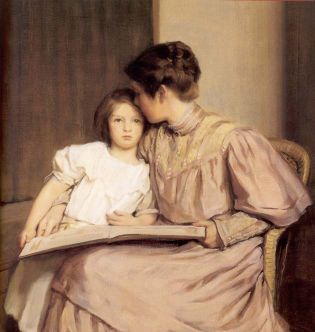 “Melissa, you’re my only true love,” whispered the mother.
“Melissa, you’re my only true love,” whispered the mother.
I was just within earshot, pretending to read. The girl leaned into her mother, received a kiss on her forehead, and then went back the children’s section of the library. The mother returned to her book.
She was a beautiful woman, with a kind face. How sad, I thought, that all she has is her daughter. She must be a widow, or have been abandoned. Has she no living siblings, or parents? Or has the family been torn asunder by some falling out? How sad. I went back to my book, but was too blue to enjoy it.
A quarter of an hour later, a young boy approached the woman. He looked to be about five years old. She reached out knowingly to him, and he fell into her embrace.
“Jimmy, you’re my only true love,” she said.
I had misunderstood. Just because the daughter is her only true love, it didn’t follow that the son wasn’t also her only true love. They both were.
Was this a mystery, a contradiction of the heart? Did she really only love Mellissa, and also, really only love Jimmy? I decided not. It was just a phrase. I imagined that at home, she probably has a husband who is also her “only true love”. But when she says it to him, I wondered, does it mean something more exclusive? What about when she says it to the dog, or to the cat?
She assembled her children and they approached the counter to check out their books. I think I heard the girl say, of two different books, that each was her “favorite.”

Hi Paige!
This is the info: An Interlude, by William Sergeant Kendall, 1907.
MdS
Hello,
Do you know the title of the painting youve included? And who it was by?
It would really be a great help.
Thanks,
Paige.
I’m enjoying this series.
😀
Pingback: trinities - Daniel Waterland on “The Father is the only God” texts – Part 1 (Dale)
James – interesting point, that your joke works! Normally we read “only” sentences to restrict the point to only one item in the domain in question.
That two-timing liar. Who could ever trust her? 🙂
Eh… no. She was talking to one kid each time. Singular is correct. She’s not saying that Melissa+Jimmy is her one true love. That ain’t something that can stand in an interpersonal relationship.
You’re of course right that English has that ambiguity problem. We southerners have been trying to correct it for years with you vs. ya’ll. But the Brits won’t have it. 🙂
You’re right that there’s no mystery here – the point is rather about reading the “one God” passages such as John 17:3 and 1 Cor 8:6.
What’s the point? It’s explaining how some trinitarians read those passages. More in coming posts.
Yes, you misunderstood — but there’s no mystery or contradiction here. The pronouns in the mother’s statements should have been taken as second-person plurals rather than second-person singulars. It’s unfortunate that the English language is ambiguous that way! (Unlike Greek; for a relevant parallel, see Luke 22:31.)
Of course, this resolution does no more to vindicate trinitarian mysterianism than your story does to refute it. 🙂
Comments are closed.